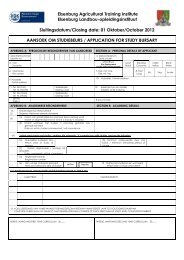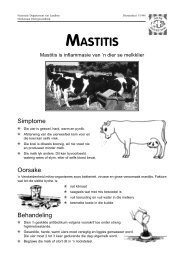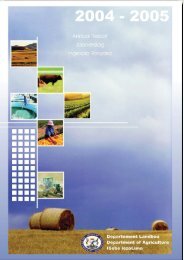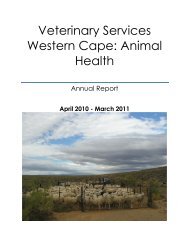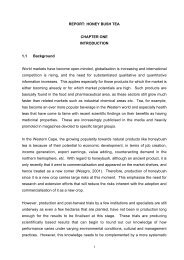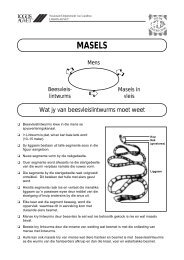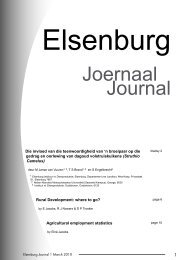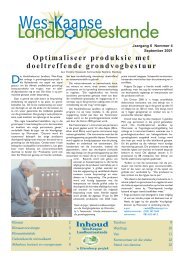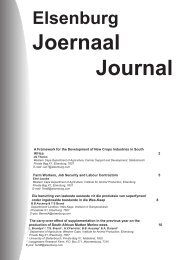The PROVIDE Project Standard Computable General Equilibrium ...
The PROVIDE Project Standard Computable General Equilibrium ...
The PROVIDE Project Standard Computable General Equilibrium ...
Create successful ePaper yourself
Turn your PDF publications into a flip-book with our unique Google optimized e-Paper software.
<strong>PROVIDE</strong> <strong>Project</strong> Technical Paper 2003: 3 October 2003<br />
<strong>The</strong> capital account includes provision for two expenditure accounts relating to<br />
investment. All expenditures on stock changes are registered in the account dstoc, while all<br />
investment expenditures are registered to the account kap. All incomes to the capital account<br />
accrue to the kap account and stock changes are funded by an expenditure levied on the kap<br />
account to the dstoc account.<br />
Conventions<br />
<strong>The</strong> equations for the model are set out in nine ‘blocks’; which group the equations under the<br />
following headings ‘prices’, ‘production’, ‘trade’, ‘income’, ‘expenditure’, ‘taxes’, ‘market<br />
clearing’, ‘GDP’ and ‘model closure’. This grouping of equations is intended to ease the<br />
reading of the model rather than being a requirement of the model.<br />
A series of conventions are adopted for the naming of variables and parameters. <strong>The</strong>se<br />
conventions are not a requirement of the modeling language; rather they are designed to ease<br />
reading of the model.<br />
All VARIABLES are in upper case.<br />
<strong>The</strong> standard prefixes for variable names are: P for price variables, Q for quantity<br />
variables, E for expenditure variables, Y for income variables, and V for value<br />
variables<br />
All variables have a matching parameter that identifies the value of the variable in<br />
the base period. <strong>The</strong>se parameters are in upper case and carry a ‘0’ suffix, and are<br />
used to initialise variables.<br />
A series of variables are declared that allow for the equiproportionate adjustment of<br />
groups of parameters. <strong>The</strong>se variables are named using the convention **ADJ,<br />
where ** is the parameter series they adjust.<br />
All parameters are in lower case, except those used to initialise variables.<br />
Names for parameters are derived using account abbreviations with the row account<br />
first and the column account second, e.g., actcom** is a parameter referring to the<br />
activity:commodity (supply or make) sub-matrix;<br />
Parameter names have a two or five character suffix which distinguishes their<br />
definition, e.g., **sh is a share parameter, **av is an average and **const is a<br />
constant parameter;<br />
<strong>The</strong> names for all parameters and variables are kept short.<br />
3.1. Price Block Equations<br />
<strong>The</strong> price block consists of ten price equations; four of which refer to the treatment of trade.<br />
<strong>The</strong> domestic price of competitive imports (P1) is the product of the world price of imports<br />
© S. McDonald<br />
17




